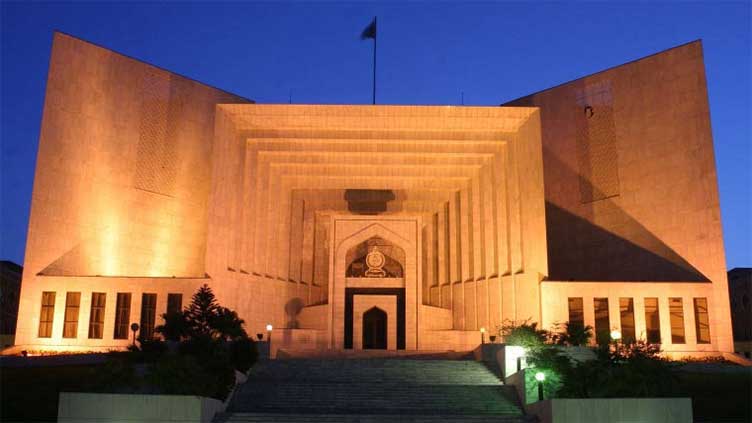Satisfy court on trial in military courts: Justice Mandokhail

Pakistan
Justice Mandokhail put the question to the defense ministry counsel
Justice Hilani observed that even after imposition of martial law, the trial was not held in a military court
ISLAMABAD (Dunya News) – Justice Jamal Khan Mandokhail on Friday asked Advocate Khawaja Haris to satisfy the court the trial procedure in military courts.
Justice Mandokhail put the question to the defense ministry counsel during the hearing of the case regarding trials of civilians in military courts in the constitutional bench of the Supreme Court.
A seven-member constitutional bench, headed by Justice Ameenuddin Khan, is hearing the case regarding the trial of civilians in military courts. The bench includes Justices Jamal Mandokhail, Muhammad Ali Mazhar, Hassan Azhar Rizvi, Musarat Hilali, Naeem Akhtar Afghan and Shahid Bilal Hassan.
At the outset of the hearing, Justice Hilali said that the officer conducting the trial in court does not pronounce the judgment himself; he sends the case to a senior officer who pronounces the judgment. How can an officer who did not hear the case give the verdict?
Justice Mandokhel observed that he has been in this field for 34 years, “but I still don't consider myself fully qualified.”
The army officer has so much experience and expertise that he can even sentence someone to death, he remarked.
Advocate Haris said that he would fully explain the procedure of military trials in the second part of his arguments. The Army Act is a special law, and the evidence and trial procedure in special laws are different, he added.
Justice Afghan asked the defense ministry counsel to explain how military court trials are not like civilian court trials. “Can you provide any example of a military court trial?"
He said that the common perception is that trials in military courts is held for sentencing. It would have been appropriate if you inform the court about the stages a trial in military courts.
Justice Afghan said he heard court-martial cases in the Balochistan High Court. In a court-martial, there is also the facility to choose a preferred lawyer. The trial in military courts is similar to that of a regular court, he observed.
Justice Mandokhail said that there is a difference between the Army Act and other laws. The Constitution ensures protection of all fundamental rights.
Justice Mazhar said that the procedure for court-martial is defined. Justice Rizvi stated that in a field marshal, there is a defense lawyer, but there are no judges.
Justice Rizvi said that he had appeared as a defense counsel in military courts. For the accused, an officer is also appointed as a friend alongside the lawyer. The trial includes arguments from lawyers and cross-examination of witnesses. The only difference is that in a military court, the judges are officers.
Justice Mandokhail said that the present case is viewed in the context of fundamental rights and Article 10-A. The Army Act applies only to the military personnel. The court will consider whether military officers have fundamental rights and get justice.
Advocate Haris said that assistance from the Jack branch is sought for writing decisions.
Justice Hilali asked the counsel that he mentioned an example where military trials also took place in the US. “If such a trial happens in another country, who are the judges?'
Justice Mazhar said in court-martials around the world, officers sit as judges. In response, Khawaja Haris said those officers have experience in conducting trials.
Justice Mazhar told the counsel that the honourable judge is asking whether these officers also possess legal qualifications?
Justice Hilali said she wanted to ask a question. “A plane carrying an Army Chief was instructed to leave the country by turning off the airport lights. In this incident, the lives of all passengers were put in danger.”
Khawaja Haris replied that how could a person who was not on the plane hijack it?
Justice Hilali said there was only a little fuel left in the plane, yet it was put at risk. Khawaja Haris responded that he would not engage in politics. However, later the Supreme Court reviewed it and acknowledged that there was enough fuel left in the plane.
Justice Hilali said because of this one incident, martial law was slapped on the country. Even after the imposition of martial law, the trial was not held in a military court.
Advocate Haris said hijacking is not a crime listed under the Army Act, which is why the trial could not proceed in a military court.
Justice Hilali posed another question: If a hijacking occurs on a military or warplane, where would the trial take place?
Later, the hearing on the intra-court appeal against the decision of civilian trials in military courts was adjourned until Monday.


